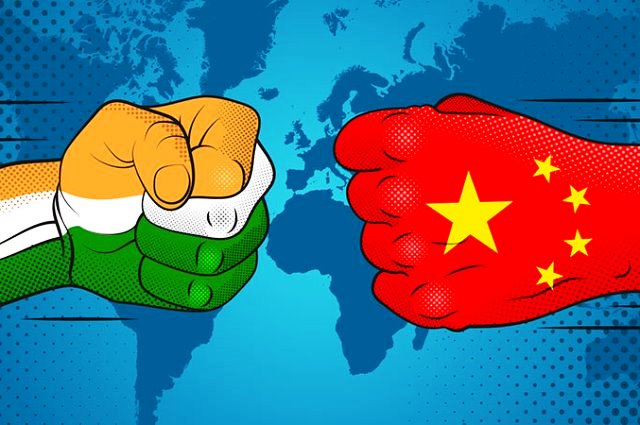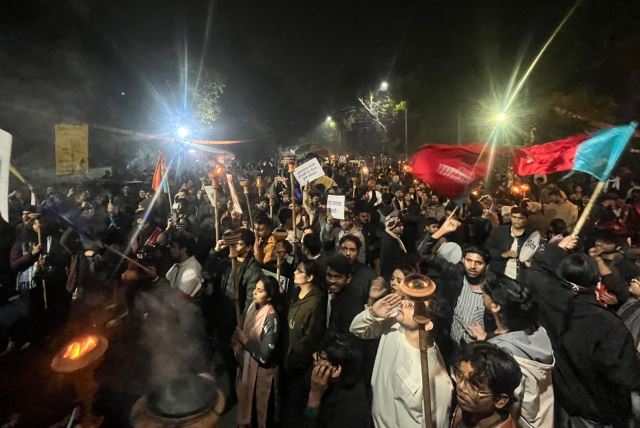
Where Do India, China Stand in Defence Tech & Military Power?
India and China: Two ancient civilizations with traditions of statecraft going back to five millennia have garnered significant attention in the last few decades owing to their economic progress and rising Gross Domestic Product (GDP). China, has reinvented itself from an agricultural economy to a manufacturing giant with global presence and has positioned itself as the second largest economy in the world, behind the United States of America. India, on the other hand, gradually makes its presence felt in the international system through impressive GDP growth rates. The two Asian giants have also been projected as rivals in the international system due to an acrimonious past.
The People’s Republic of China has projected itself as a peaceful nation. Such claims of a peaceful rise have been proven hollow when its military expansion and expenditure is considered. Combined with Beijing’s proclivity towards territorial aggrandisement through power projection, its focus on military has alarmed the international community. For India, a militarily aggressive and powerful China presents unprecedented challenges. India shares a lengthy border with China and has engaged in a full-fledged war in 1962 and has faced regular incursions from the People’s Liberation Army (PLA) over the last two decades. A recent incident in Galwan Valley (2020) led to casualties on both sides and at some points Indian and Chinese army still maintain a forward presence at the Line of Actual Control. In the south, strategically important Indian Ocean has witnessed naval forays from the Peoples Liberation Army Nay (PLAN). Consequently, India has been investing to improve its armed forces through purchase of equipment and technology acquisition from suppliers from the West and to reduce the burgeoning gap between the two military forces.
Global Firepower, recently released a country wise military strength report for the year 2024 which indicates that the PLA have an overwhelming advantage over the Indian military. It compiles data for 60 factors/ parameters, both military and the supporting infrastructure within a nation. It is clear that only in terms of absolute numbers of personnel that India ranks higher than China whereas in overall equipment strength and capacity China far outweighs the Indian military. China’s defence budget is US$ 224 billion compared to India’s US$ 74 billion.
Combined with the impressive infrastructure construction along the border with India in the Himalayas and its southern and western neighbours, the PRC projects as a formidable military power. China’s power index of 0.0706 ranks third only to the United States of America and Russia (Global Firepower 2024). Though India ranks fourth in the world with power index of 0.1023, the number of critical equipment in Navy and Air Force is much higher with PRC. Furthermore, China has been able to enhance its indigenous capabilities to produce submarines, frigates, corvettes and aircraft carriers for the PLAN. Currently PLAN has the highest number of active vessels in the world, even surpassing the United States. For India, it is only early stages for indigenous construction of military equipment. Similarly, in the case of fighter aircraft for both Air Force and Navy, China has developed fifth generation aircraft comparable to the United States Air Force. The number of combat ready and trainer aircraft with China is more than double the number of India’s. This is only a brief overview of Chinese capabilities, further detailed analysis reveals the larger extent of disparities.
ALSO READ: India And China – Beyond Zero-Sum Game
The scenario presented by successive governments in India, however, gives an impression that it is competitive when compared to China on a number of parameters. The oft cited examples are high end technologies of space exploration, missile technology and nuclear technology. A careful analysis of India’s space programme vis-à-vis the PRC reveals that the Chinese over the last two decades have achieved significant progress and its Lunar and Mars missions have been more successful than India’s. India’s indigenous expertise in launch of satellites is exemplary and with comparably low costs it caters to the demand of a number of countries. Importance of the three related technologies for military usage cannot be overstated. Satellites are now capable for providing real time data with high resolution which is an asset during times of conflict or peace. Advanced Weapon systems now require satellite connectivity and instant communication of critical data and imagery. Data from 2023 reveals that India has 58 satellites in orbit while the PRC has 493 in orbit (orbit.ing-now.com). China, therefore, has an advantage in surveillance and location technology through its satellites. Furthermore, China National Space Administration runs the space station Tiangong since 2021 with smaller capacity than the International Space Station but hosts astronauts on a permanent basis. For India, such capabilities are still only a long term goal.
Above are only two examples of Chinese dominance on the larger Eurasian landmass through indigenous technological capacity. A major component of the Chinese technological innovation is research and development. National programmes devoted to innovation, combined with huge funds for research and development has resulted in cutting-edge technology. China remained top filer of patents at the World Intellectual Property Organization (WIPO) with 69,610 filings in 2023 (World Intellectual Property Indicators 2023). It can be said with certainty that a number of these patents are dual use technologies and some may be purely military technologies. India’s record in terms of filing patents is improving steadily with 66440 filings in 2022-23 (World Intellectual Property Indicators 2023).
With such investment and expenditure in critical and conventional military technologies, PRC has surged ahead in the last two decades. India, on the other hand has higher number of military personnel and a favourable geography in the Indian Ocean and in the larger geopolitical construct of Indo-Pacific. China comfortably outscores India in other markers of a superior military. The way forward for India is meaningful cooperation with Indian Ocean littoral states and its smaller northern neighbours to overcome the Chinese dominance over land and maritime space.



